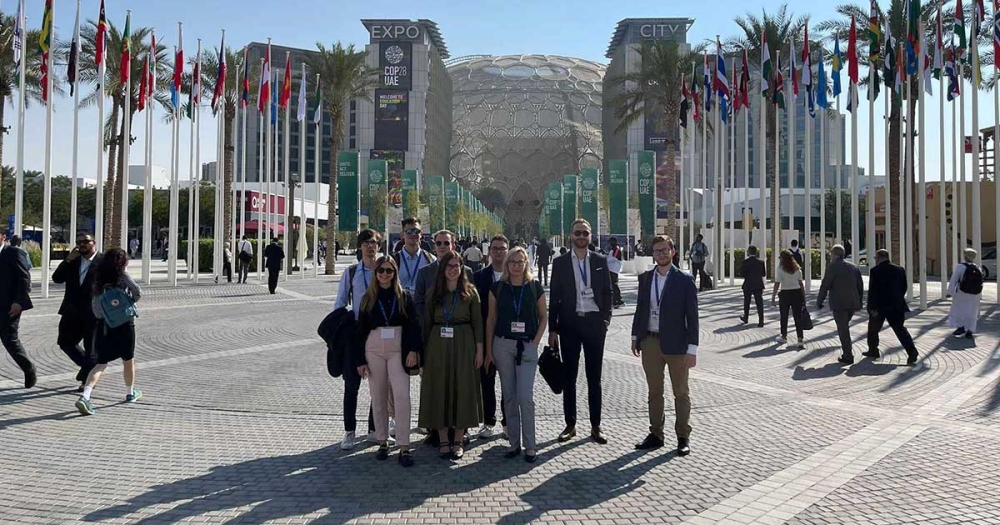In Mostly Harmless, the ‘fifth book in the increasingly inaccurately named Hitchhiker’s Trilogy’, Douglas Adams wrote that ‘in New York…if you are keen to breathe, the best plan is to open a window and stick your head in a building’.
I am reminded of this as our CPI team of 3 staff and 7 students step off the aircraft onto the apron of Dubai airport, and into the dead heat of the Arabian peninsula.
We are here to attend the 28th ‘conference of the parties’, or COP28, the annual climate negotiations, that have fast become perhaps the world’s largest annual international gathering of the MacBook & lanyard class, and undoubtedly the most high profile.
The purpose of COP, of course, is to determine global policy on how to both mitigate and adapt to anthropogenic climate change. This year, all the talk is of the ‘operationalisation’ of the ‘loss and damage’ fund - an international aid programme for countries ‘on the front line’ of the ‘climate crisis’.
With an atmosphere that is something of a cross between the World Cup Final and Burning Man - particularly this year as it is being held in the desert, but more generally given COP is the final round of year long negotiations, and has rapidly developed a festival atmosphere since it began in 1995 - this year’s event is fascinating in as much for the questions it provokes about the state of ‘global civil society’ as for what answers it has to offer for climate change itself.
COP is being held at the end of a metro line in the dusty outskirts of Dubai, in a brand new Expo Centre that, while vast, appears humble next to the oil refineries that ring it, their barber’s pole chimneys punctuating the horizon in all directions.
The juxtaposition is impossible to miss, and on passing security - as intense as any airport - one discovers the colonisation of COP by corporate interests, mouthing empty slogans (‘the power of youth!’), appears to be complete.
The whole event has the structure of a trade show, but with its attendees having little to sell other than assurances that they subscribe to the shibboleths of the moment. Thus, from businesses to governments, NGOs to universities, everyone with a brand to polish is here with a stand, a stack of leaflets written in corporate vernacular, and blandishments polished to such smoothness that they immediately slip the mind.
It is debatable whether the negotiations themselves can achieve much, given that a global consensus is typically only possible when the wording is so vague as to mean anything, which is closer to meaning nothing than something. Infamously, at COP26 in Glasgow, a commitment to ‘phase out’ coal was changed at the last minute to ‘phase down’, a phrase that has no particular meaning in English. So it goes where political ideals collide with economic reality.
What is clear, however, is that COP has been coopted by the very form of political economy that provoked its existence. Much like Dubai itself, this is the sort of event that only late stage capitalism might produce - a monument to the branding-industrial complex. One cannot help but sense that in its contradictions and shallow affect, COP is less a cure for what ails us, but is rather a symptom of the problem to be cured.
As a research trip, it was therefore instructive. For, of course, we care about climate change because we worry about its effect on society, and we wish to see society change in order to mitigate and adapt. But as ever, the most difficult problem, in the face of a changing climate, and even as we aspire to change society, may be the least comfortable, and in being closest to us, the most difficult to see: that human nature does not change.




